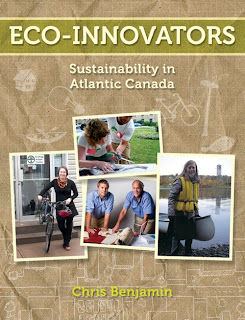The Call of the Ocean
In The Call of the Ocean, Jim
Wellman profiles some of the most fascinating men and women ever to answer the
call of the North Atlantic. Recently we spoke with him about the book.
When and why did you want to be a
writer?
I took an early retirement from the CBC in 1997. I had worked
with the corporation for almost 30 years and for exactly half that time (the
last half) I was host of the Fisheries Broadcast. The “Broadcast” as it called, had an interesting
story of is own and I decided to write it. My book “The Broadcast” was published in 1997.
Are they the same reasons you do
it today?
The Broadcast book made me
realize that I liked writing. I had never written anything before but it was
fun and made me want to do more. As luck would have it, just as my first book
was published, I received a call from someone with the TriNav Group of
Companies who wanted to start a fisheries publication. I began writing for the Navigator Magazine in October 1997 and continues to do so today. My book
stories are originally published in the Navigator and rewritten
for book form later as a collection of short stories.
What inspired you to write The Call of the Ocean together?
The Call
of the Ocean is my ninth book and the seventh in a series of books about people
in the commercial fishing industry in Atlantic Canada. The first four were
about tragedy or close calls at sea. I restrict my stories to the so-called
“inshore” fleet. My last three books added stories about interesting people —
profiles of people in the fishing and marine industries who have great stories
to tell.
What was the most challenging aspect of the process?
Perhaps
trying to decide whether I’m a writer or a story teller. I’ve never fancied
myself as much of a writer so I settled on calling myself a story teller who
carries out his craft in print.
What was the most rewarding part of the experience?
It may
sound odd but the most rewarding part of the experience is the gratitude of
families of a loved one who died at sea after I write the story. That may need
explanation because it may not make sense at first to hear how rewarding it is
to write about tragedy. But, as stated earlier, I write about small-boat
people. Their losses are usually just a short story in the evening news and
nothing more in terms of publication. Families appreciate it when they have a
more detailed story of the loss of their father, son, brother, husband etc.
because now they have something tangible that is a public record they can pass
on to their grand children. A woman from Nova Scotia summed it up well. I had
written a story about the loss of her teen-aged son at sea. I met her and she
hugged me and said: “Thank you for believing my boy was important enough to
write about in your book.” That line and her deep gratitude has stayed with me
ever since.
What did you learn during the
process?
I’ve
learned that most people are far nicer, more sensitive, more interesting and
more decent than we think. And, they deserve more respect than they are
sometimes given.
How did you feel when
the book was completed?
It’s
always a great sense of accomplishment — that I’ve told the stories of some
really fascinating people that deserve the recognition. That moment is followed
immediately by the desire to start working on the next book.
What has the response been like so far from those that have read it?
The
response is always pleasant. People enjoy reading about people and the folk I
write about are all interesting so the response is always complementary.
What makes a good book?
One that
makes people want to read it again and/or want to get the writer’s next
offering as soon as it is published. I’m not one who gets fancy or academic
about what is good or bad. If a lot of people like it then that makes it good
in my view.
Is your creative process more 'inspirational' or 'perspirational'?
Definitely
‘inspirational.” The people I write about are all inspiring and should
be known better.
What are your thoughts on Newfoundland's literary scene?
I believe
it is very much alive and very healthy.
What's next on your creative
agenda?
I’ll have
another book about more of those amazing sea folk next year. And I will
continue to tell their stories for as long as the Navigator Magazine and Flanker
Press, my book publishers, are interested.



